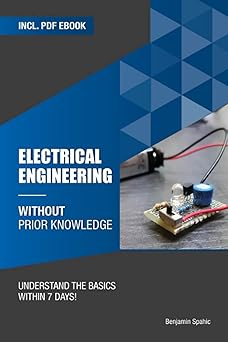Description
Starting electrical engineering without prior knowledge can be an exciting and rewarding journey, but it requires a systematic approach to build up understanding and skills from the ground up. Here’s a roadmap to guide you through the fundamentals:
### 1. **Basic Math Skills**
Electrical engineering relies heavily on math, so strengthening your foundation in the following areas is essential:
– **Algebra:** Solve equations and manipulate variables.
– **Trigonometry:** Understand angles, sine, cosine, and tangent functions.
– **Calculus:** Learn basic differentiation and integration to understand changing electrical quantities (voltage, current, etc.).
– **Linear Algebra:** Vector spaces and matrices are used in electrical circuits and signal processing.
### 2. **Physics Fundamentals**
Electrical engineering principles are deeply rooted in physics, so it’s crucial to understand the basics of:
– **Mechanics**: Forces, motion, energy, and power.
– **Electromagnetism:** Learn about electric fields, magnetic fields, and how they interact. Key topics include:
– **Coulomb’s Law:** Describes the force between charged particles.
– **Ohm’s Law:** Relationship between voltage, current, and resistance.
– **Faraday’s Law of Induction:** Understanding how voltage is induced by magnetic fields.
### 3. **Basic Electrical Concepts**
These are the core topics you’ll need to familiarize yourself with:
– **Voltage (V)**: The potential difference between two points that drives current.
– **Current (I)**: The flow of electric charge through a conductor.
– **Resistance (R)**: The opposition to the flow of current.
– **Power (P)**: Energy per unit of time delivered to a component or system.
**Ohm’s Law** is fundamental:
\[
V = I \times R
\]
### 4. **Introduction to Circuits**
Circuits are the backbone of electrical engineering. You’ll need to understand:
– **Series and Parallel Circuits**: How resistors, capacitors, and other components are arranged.
– **Kirchhoff’s Laws**: These help analyze complex circuits. Kirchhoff’s Current Law (KCL) and Kirchhoff’s Voltage Law (KVL) are key tools.
– **AC vs. DC**: Alternating Current (AC) and Direct Current (DC) have different behaviors, and engineers must know how to work with both.
– **Capacitance and Inductance**: Study how capacitors and inductors store energy in electric and magnetic fields.
### 5. **Basic Components and Their Functions**
Understanding the basic components is essential for designing and analyzing circuits:
– **Resistors, Capacitors, and Inductors**: Each component affects the current in different ways.
– **Diodes and Transistors**: These control the direction of current and amplify signals.
– **Batteries and Power Sources**: Sources of electrical energy.
### 6. **Electrical Engineering Tools**
Learning to use basic tools is crucial:
– **Multimeter**: Measures voltage, current, and resistance.
– **Oscilloscope**: Analyzes the waveform of electrical signals.
– **Circuit Simulation Software**: Programs like SPICE or Tinkercad Circuits allow you to simulate electrical circuits virtually before building them.
### 7. **Electronics and Signals**
As you advance, you’ll dive deeper into electronics and signal processing:
– **Amplifiers, Oscillators, and Filters**: Learn how to manipulate and shape electrical signals.
– **Fourier Transforms**: Mathematical tools for understanding signal frequencies.
### 8. **Programming and Control Systems**
Many electrical engineering tasks involve programming, especially for automation and control systems:
– **C/C++ or Python**: Learning a programming language to control hardware or process data.
– **Embedded Systems**: Devices like microcontrollers and Arduino that integrate software with hardware.
### 9. **Resources for Learning**
There are many accessible resources for beginners:
– **Books**: Some good introductory books include “Electrical Engineering 101” by Darren Ashby and “The Art of Electronics” by Paul Horowitz.
– **Online Courses**: Platforms like Coursera, edX, and Khan Academy offer excellent beginner-level courses.
– **YouTube Channels**: Channels like “EEVblog” and “Afrotechmods” can provide visual explanations and tutorials.
– **Practice**: Engage with real-world projects, build simple circuits, and experiment with hands-on kits like Arduino or Raspberry Pi.
### 10. **Application Areas**
Once you have a solid understanding of the basics, you can explore specialized fields of electrical engineering:
– **Power Systems**: Distribution of electricity and the design of grids.
– **Communications**: Radio, wireless systems, and signal processing.
– **Control Systems**: Automating processes and machinery.
– **Embedded Systems**: Integration of software with hardware in devices like microcontrollers.





Reviews
There are no reviews yet.